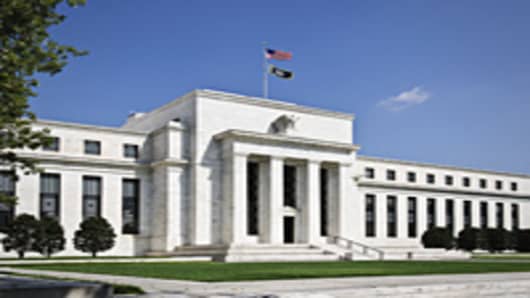A new analysis of the Federal Reserve Bank system by government auditors criticizes the central bankers for shortcomings in three areas: lack of diversity, appearance of conflicts of interest and lack of transparency.
The long awaited report was mandated by the Dodd Frank Wall Street reform law, which required the Government Accountability Office to review the governance of the Federal Reserve Banks.
The report comes at a time when the practices of the nation's central banking system are coming under intense criticism from both the left wing protestors of Occupy Wall Street and conservative GOP candidates running for that party's presidential nomination.
In the report, the GAO said that the ethnic and economic diversity of board members at the Fed regional banks "was limited."
In 2010, the report found, minorities "accounted for 15 of 108 director positions. Specifically, in 2010 Reserve Bank directors included 78 white men, 15 white women, 12 minority men, and 3 minority women."
It also found that labor and consumer groups had less representation among class B and C directors than did people from the agriculture, commerce, industry and services sectors.
The report said that the make up of the Federal Reserve Bank boards of directors also raises the appearance of conflict of interest.
"Directors of all three classes can have ties to the financial sector," the report found. "While these relationships may not give rise to actual conflicts of interest, they can create the appearance of a conflict as illustrated by the participation of director-affiliated institutions in the Federal Reserve System’s emergency programs."
The GAO suggested that the boards adopt specific procedures to lessen the potential for conflicts of interest. "To increase transparency, GAO recommends that all Reserve Banks clearly document the directors’ role in supervision and regulation activities in their bylaws. One option for addressing directors’ conflicts of interest is for the Reserve Bank to request a waiver from the Federal Reserve Board, which, according to officials, is rare. Most Reserve Banks do not have a process for formally requesting such waivers."
And on transparency generally, the report found that the Fed's governance practices tend to be "less transparent" than those of comparable institutions around the world.
"For instance, comparable organizations make information on their board committees and ethics policies available on their websites; most Reserve banks do not," the report found. "To further enhance transparency of Reserve Bank governance, GAO recommends that Reserve Banks make public key governance documents, such as bylaws, ethics policies, and committee assignments."



